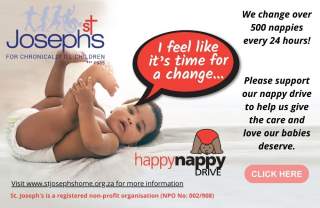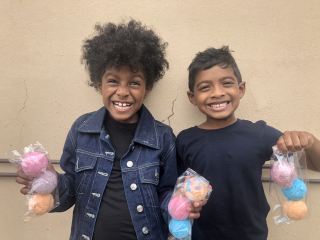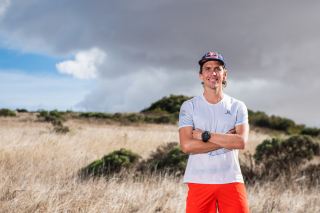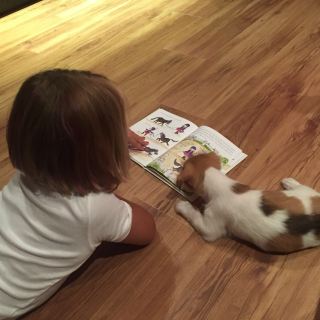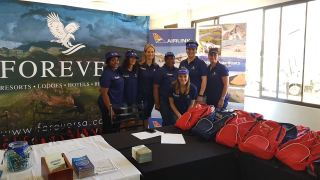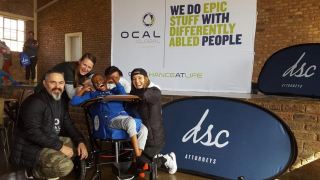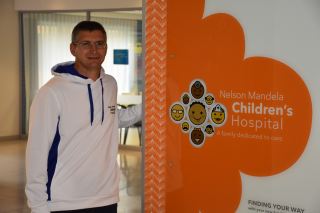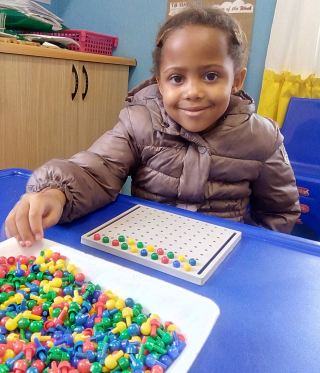Changing 500 nappies a day? That’s THE normal at St Joseph’s!
St Joseph’s annual Happy Nappy Drive is underway
Changing 500 nappies a day may sound like an impossible task to most people but this daily marathon of providing sanitary hygiene to medically fragile children is par for the course for the staff at St Joseph’s in Cape Town. This well-loved institution provides intermediate, facility-based care for children with chronic or life-limiting conditions.
For the past 85 years, this beacon in paediatric care in Southern Africa has been providing expert and hands-on nursing and rehabilitation for over 23 000 children from vulnerable communities.
Their annual Happy Nappy Drive is underway and emphasises the tremendous needs of St Joseph’s in the practical aspects of looking after and taking care of medically fragile children.
“On average children with life-threatening conditions stay for six months, receiving holistic and multi-disciplinary medical treatment free of charge,” says Christa Robijn, St Joseph’s resource development manager.
She adds: “Every 24 hours we use more than 500 nappies and our annual nappy bill is more than R500,000. The Happy Nappy Drive is vital to meeting our children’s needs and our goal this year is to raise R250,000 and collect over 50,000 nappies.”
Disposable nappies
As St Joseph’s treats children with life limiting and life-threatening illnesses it uses disposable diapers as it has been proven that disposable diapers are effective in decreasing probable sepsis in neonates.
“Using disposable diapers also decreases the number of diapers used per day,” Christa explains, “and also the number of times a nurse comes into contact with a baby, especially during these COVID-19 times. Operationally, our in-house laundry also has limited capacity. Of course, we care about the environment, but we also care about a high standard of critical medical care and disposable items are needed to achieve this.”
Not considered medical
As nappies are not considered medical consumables by the Department of Health, this puts an extra financial burden on parents in the vulnerable communities, especially parents of chronically ill children.
Says Christa: “As a non-profit organisation, St Joseph’s runs a 175-bed facility and we rely on donations from organisations and individuals to enable us to provide the best quality care for our children. We fundraise all year round through various initiatives like our Happy Nappy Drive.”
There are various ways to join the Happy Nappy Drive:
- Donate safely and quickly on St. Joseph’s website:
https://stjosephshome.org.za/donate/happy-nappy-drive/ A pack of nappies is about R260, but there is no minimum amount - every little bit helps!
- Alternatively, nappies can be ordered online at Clicks, Dischem or Pick n Pay and delivered to Joseph’s, 40 Pallitti Rd, Montana, 7490, Cape Town.
For lots more info on the Happy Nappy Drive and St Joseph’s, go to: https://stjosephshome.org.za
Contact:
Christa Robijn
Resource development manager, St Joseph’s Home for Chronically Ill Children
Tel. +27 21 934 0352
Email: This email address is being protected from spambots. You need JavaScript enabled to view it.
Durban Kids Launch Their Own Online Store
Siblings Gianna, Kenley and Danica McIntosh aren’t your average kids – they just launched Kidpreneurs, a handmade Bath Bomb business at 8,6 and 5 years old. These Durban kids were born in the Middle East and arrived in South Africa in 2015, and are groomed for business by the parents.
After a successful launch at their local shopping complex in Queensburgh, Durban, the siblings are being bombarded with bulk custom orders for Christmas, as well as orders for bath bomb party favours. Their online store, www.kidpreneur.online was set-up so that their bombs could be sold to South Africans across the country. Their booming business sells handmade bath bombs that transform your bath into a luxurious spa experience by fizzing and releasing essential oils and fragrances. In addition to bath bombs, the McIntosh siblings make Shower Steamers, which you place in the corner of the shower and as hot water splashes on the steamer, essential oil fragrances are released. The McIntosh siblings hope to see their products being sold in major stores across South Africa.
8-year-old Gianna hopes to be a property developer when she is older. 6-year-old Kenley hopes to be a builder, while the youngest sibling Danica wants to own a bakery. These money-savvy kids plan to invest their business proceeds to fund their tertiary education. One thing is for sure….with a strong entrepreneurial foundation, these kids are destined for greatness!
THE SANDMAN CHAMPIONS THE CAUSE FOR HUNGRY CHILDREN
The Southern Lodestar Foundation, an organisation providing nutritional solutions at schools requiring intervention; and provides thousands of school children with a nutritionally balanced breakfast every day; has recently appointed ultra-marathon trail runner, Ryan Sandes, as an Executive Director.
“I am really excited to join the Southern Lodestar Foundation,” says Ryan Sandes. “André Redinger and his team have been doing some amazing work at setting up nutritional solutions in schools and early childhood development centres in impoverished areas. I have been given so many opportunities in life that I feel it is really important to give back and create positive change!”
The Southern Lodestar Foundation was born out of a need to improve the lives of impoverished children across Sub-Saharan Africa. Through education and nutrition, the Foundation aims to create meaningful change, foster hope and deliver sustainable transformation to enhance the long-term health and development of individuals and nations in Sub-Saharan Africa.
“I have such gratitude and feel honoured that Ryan has joined our board,” says Southern Lodestar Foundation Founder, André Redinger. “Ryan has shown great care to our foundation from the outset when introduced to SLF a few years ago - on what we do and in the integrity of our service to our children. He loves South Africa and as a fellow South African will assist the foundation and its communities in having an impact on current and future generations; both from a nutritional perspective as well as from personal development of individuals throughout our continent.”
“Our passion is to feed, nurture and grow communities through knowledge and nutrition as we believe that no-one can reach their full potential on an empty stomach,” explains Redinger. “And who understands the importance of nutrition more than an ultra-athlete?”
As an ultra-distance runner, Sandes, knows the true value of good nutrition. “In my game you cannot get far without good nutrition. I have had a number of nutritional bonks during races and I know how debilitating that feels, so I can only imagine what these children go through on a daily basis not having access to food!”
Founded by three ultra-distance runners, the Southern Lodestar Foundation also aims to use running as a tool to inspire change at grass roots level. “By identifying individuals with a passion for running, who are determined to succeed and committed to challenging themselves, we plan to develop a team of dedicated athletes to take on ultra-marathons, run the journey with us, and inspire the champion in each other,” explains Redinger. “In-turn, the aim is for them to inspire others who look up to them as role-models and have aspirations to run and to carry the message of hope to the children supported by the Foundation, bringing much needed awareness to Vitamin and Mineral deficiencies amongst our communities.”
“Through projects that focus on nutrition, nutritional education and inspiring children to be healthy and active, we hope the see the children of Southern Africa nourished, educated and inspired to change our country, and beautiful continent for the better,” says Sandes.
For more information on the Southern Lodestar Foundation please visit
Website - https://lodestar.org.za/
Facebook - @SouthernLodestarFoundation
Hidden Benefits of Reading with your Children that you might not have known
We all know how important books and reading are to our children, but there are some hidden benefits you might not have realised. Author and Mom, Candice Noakes-Dobson, who writes the A Little Horse Called Pancakes Book Collection, shares some of the hidden benefits of reading with your child that she has discovered.
- It helps to build a stronger bond between you and your child, and gives them a sense of closeness and well-being that will help them feel more loved, which in turn helps them to learn more
- This closeness also helps children build a positive association with reading, which helps foster a love of books and reading as they grow older.
- It helps your child to calm down and fully relax
- It helps to open communication lines with your child, helping them talk and open up to you
- It helps to build listening skills and grow their imaginations
- It helps to increase their attention spans which helps them to be able to concentrate for longer periods of time
- It helps them to learn early thinking skills like understanding cause and effect, exercising logic, as well as thinking in abstract terms. They are also able to learn the consequences of actions, and the basics of what is right and wrong.
- It can help your child through a stressful situation by reading them a story about a character going through what they are going through and seeing how they are able to overcome it.
- Many studies have shown that children who do well at school were all read to as young children, so you will help have a positive influence on their learning abilities.
- Reading to your child helps them to become a lifelong reader!!
For more info on the Pancakes book collection please visit:
- Facebook - @pancakesbookcollection
- Instagram - @alittlehorsecalledpancakes
Critical Analysis of Racial Segregation at Laerskool Schweizer-Reneke
By Devan Moonsamy CEO of The ICHAF Training Institute
The first term of school this year has not gotten off to the best start for some children and their parents. At Laerskool Schweizer-Reneke in North West Province, a teacher has been suspended over racial segregation of children in a class. A photo was sent to parents by WhatsApp by the teacher which clearly shows a large group of white children seated together, and a few black children separated from the group at another desk. That’s a red flag, and a political protest was held outside the school.
But is this what people so quickly assume it to be? A number of explanations have surfaced. Firstly, this is simply the work of a racist teacher showing preference to the white children. Schweizer-Reneke is a town said to have deep racial divisions, and some say the teacher was even doing the right thing because of these tensions and because integration takes time.
Secondly, that the black children were new at the school and could not speak Afrikaans or English. Why this was in fact necessary was not made clear by the school. One reason could be that the children required a different teaching intervention which the teacher planned to give them in a small group setting. Separating learners according to needs in this way is a common practice and seems to make sense.
However, it is strange that the children who are said to need special attention are placed at the back of the class in the corner. Was it necessary to make them feel even more excluded in this way? It just doesn’t add up. MEC Sello Lehari who went in to address the situation has rejected this excuse and is investigating further.
Thirdly, it has been said that the children were allowed to sit where they wanted, and so the seating arrangements were their choice. This last reason is somewhat plausible because we do all tend towards ‘birds of a feather’ habits, and perhaps more so for young children in such a setting. But it would still seem unlikely that the children end up in the particular arrangement shown in the picture on their own. Does it not seem too well organised for these small children aged between four and six?
On social media, people were angered, and said it is unacceptable, while others say it is a ‘fake racial event’. Another teacher is to take the suspended teacher’s place, but some parents have already removed their children from the school.
Making an analysis this soon is difficult. More information is needed. However, I propose that it is the duty of the teacher in question and the school to make a formal apology at the very least for an insensitive way of arranging the children in the class. The teacher ought not to have placed the black children away from the others and at the back, especially if they needed more attention due to a language barrier.
Whether intentionally racist or not, it is highly offensive, and it is what we are supposed to be working very hard to prevent. Education has long been a site of racial contention, and we need to tread carefully. People of colour already feel marginalised in many settings. There is no need to throw that in their faces, and in such a personal way.
People are also naturally very protective of their own and other people’s children, and rightly so. It is not unfair to take to social media seeking public attention and comment on this photo. We need to debate this and ensure that children across South Africa are not subject to segregation or favouritism for any reason.
Let this be a warning to all teachers, educators, schools, colleagues, universities, trainers, etc. – we must be sensitised on these issues of racism in education.
Devan Moonsamy is the author of Racism, Classism, Sexism, And The Other ISMs That Divide Us, available from the ICHAF Training Institute.
The book tackles contemporary issues in the South African workplace, including a variety of diversity-related challenges and how these can be overcome. It is an excellent guide for managers to harnessing diversity for success.
ICHAF offers SETA-approved training in business skills, computer use, and soft skills. Devan specialises in conflict and diversity management, and regularly conducts seminars on these issues for corporates. To book a seminar with Devan or for other training courses, please use the contact details below.
Tel: 011 262 2461 | Email: This email address is being protected from spambots. You need JavaScript enabled to view it. | Website: ichaftraining.co.za
FOUNDATION FOR CHILDREN WITH HEARING LOSS IN SA RECEIVES R189 093.01 AT GOLF DAY
Gauteng, South Africa – On Thursday, 15 November Forever Resorts South Africa hosted their annual Charity Golf Day, this year in aid of the Foundation for Children with Hearing Loss in SA at Blue Valley Golf and Country Estate.
The Foundation aims to improve the quality of life for people with hearing loss, creating a sustainable future for people with hearing loss, inspire, educate, develop and empower an entire community, create fresh perspectives and innovative solutions, promote social welfare, encourage poverty alleviation and generate a lasting change.
The Forever Golf Day raised a total of R189 093.01 and the funds were paid over directly to the foundation to help three children (Haley Smit (4 years), Ronisha Malander (4 years) and Mulweli Makhuva (9 years)) with funds to pay for their cochlear implants. Mulweli underwent his operation on Monday, 19 November 2018 and will now be going through the process of slowly training his brain to hear again as he lost his hearing due to illness some years ago.
“On behalf of Forever Resorts we would like to thank our wonderful sponsors who participated in our annual Golf Day, without you, your passion and your selfless generosity this would not have been possible. Oranje Drukkers, Bravo Group Sealy, Backgat Braai, Adams&Adams, Pam Golding Nelspruit, Beeld, Birchwood Hotel, Unlimited Events Group, Forever Warmbaths, Forever Badplaas, Forever Gariep, Forever Centurion, Forever Loskopdam, Forever White River, BDT Accountants, AirlinkVictoria Falls Rainbow Hotel, Wild Horizons Tours, The Good Oaks, Pentagon Security Consultants, FNB, Valorem, Agri SA, Rockwood Theatre, Delheim Wines, Levati Water, Rhino Clothing, Work Front, Dairymaid, Pretoria FM, Decimal Agency and Zebula Golf Estate and Spa”, said Heidi Halgryn, Marketing Executive at Forever Resorts South Africa.
NPC and Attorneys Tackle Disability Stigma One Hug at a Time
According to the World Health Organization, as many as 15% of all South Africans live with a disability. Many of these people are children – and in too many cases, they’re not receiving the basic support they need.
International NPO, Human Rights Watch, estimates that half a million children with disabilities aren’t being offered access to quality education. South Africa’s Department of Basic Education statistics for 2017 indicated that 11 461 children with disabilities were on special school waiting lists.
With so many overwhelming statistics, it’s easy to focus on the logistical problems and, in the process, forget about the children who make up those figures. Many of these kids say the hardest part about being disabled is the discrimination. Being treated like a number only makes it worse.
“Sometimes all these kids need is just some love and attention. They are children after all and they deserve to have some joy in their childhood, says Nicolene Mostert founder of NPC, One Chance At Life (OCAL) Global. Mostert’s organisation does much to combat the stigma associated with disability.
The organisation’s goals are to provide wellness activities, economic opportunities and sustainable skills development programmes for differently abled people. With the assistance of DSC Attorneys, a law firm specialising in personal injury and Road Accident Fund (RAF) claims, the organisation is tackling the issues one step at a time.
One of the projects OCAL Global is currently running involves working with differently abled children in the Pixley ka Seme District in the Northern Cape. The goal is to bring some normality to these children’s lives, through simple, fun activities like colouring-in, face-painting and playing games. Mostert has been working in this area for several years and has identified over 2000 children under the age of 12 who have disabilities and who haven’t once seen a doctor or been properly diagnosed.
12-year-old Thato (name changed), for example, suffers from cerebral palsy and needs his mother’s constant assistance to perform basic day-to-day activities. Because he can’t walk, his mother often has to carry him on her back, covering long distances when she runs daily errands.
On a recent trip, DSC Attorneys and OCAL Global delivered a wheelchair to Thato and his mother. The simple donation has made a real difference to the boy’s and his mother’s lives. Thato reports feeling much more independent and his confidence has grown. His mother says, “It’s the first time in 12 years that I’ve felt hope”.
“Sometimes we think we need to make some big change to have an impact, but even the smallest effort can have a huge effect on someone’s life. I was really grateful to see that”, says Jacqueline Hudson, associate attorney at DSC Attorneys.
OCAL Global is focused on making persistent impact at grass roots level, “because that is how we bring change and hope to those who need it most,” says Mostert. She says much change can be brought by companies just evaluating their approaches to corporate social investment.
Anyone who’s interested in supporting OCAL’s cause can contact Nicolene Mostert on This email address is being protected from spambots. You need JavaScript enabled to view it. or call on 083 314 7349.
Civil Society Champion to Race through Kalahari Desert for NMCH
(Johannesburg) Extreme athlete and social activist, David Barnard, is set to run 250 kilometres in the Kalahari Augrabies Extreme Marathon (KAEM) from 20 to 26 October 2018 in support of the Nelson Mandela Children’s Hospital (NMCH). Stretched over seven days, the desert race is a test of endurance and takes place in the proximity of the Augrabies Falls on the Orange River.
Barnard is the first African to have completed multi-stage desert races on all seven continents, and he boasts an extensive background in civil society and worked on development programmes across Africa.
Through the Desert 2 Desert, a running platform championing social causes and campaigns through extreme desert races, Barnard will be raising funds for the hospital in honour of the centenary year of Madiba’s birth.
Says Barnard: “In our society there’s so much that can be done to address very common and complex issues. For many South Africans sport is an opportunity to participate but increasingly also an opportunity to give back and a vehicle to raise awareness.”
Initiated by the Nelson Mandela Children’s Fund, NMCH is a legacy project of former president Nelson Mandela and a tertiary specialist referral paediatric hospital based in Parktown, Johannesburg. The 200-bed facility is the second dedicated paediatric hospital in Southern Africa and admitted its first patients in June 2017.
Since opening, NMCH has treated over 1 000 children in need of surgical and life-saving interventions as a result of complex illnesses and continues to phase in operations offering critical services including: Neonatal and Paediatric Intensive Care Units (the largest in the country), Cardiology, Cardiothoracic Surgery, Dialysis, Neurosurgery, General Paediatric Surgery, Orthopaedic Surgery, supported by Anaesthesiology, Pharmacy, as well as Radiology.
CEO of NMCH, Dr Mandisa Maholwana, says the hospital is honoured by Barnard’s contribution. “We are extremely grateful for the support we receive from individuals like David and the global community who have committed themselves to the realisation of our vision to give children a chance to live and thrive.”
As a public benefit organisation, NMCH has a unique funding model as it only receives operational funding from the government to treat public patients and independently fundraises to support its capital expenses. “No child who is appropriately referred to this facility is turned away, regardless of socio-economic standing. This is a welcomed contribution that will go a long way in improving access to specialised healthcare for desperately ill-children in the region,” added Maholwana.
Barnard, who returned from Iceland in September after completing yet another 250-kilometre race, aims to raise R250 000 through the public fundraiser. The target is aimed at encouraging at least 2 500 individuals or corporates to donate a minimum of R100 each.
“The only way we can solve the complex issues we face is through many people making small contributions,” says Barnard. “You don’t need a lot of money to make a difference. I challenge every South African to make a contribution. This is an opportunity to do something in honour of Madiba’s legacy.”
The public can support Barnard through BackaBuddy by donating as little as R100.
Barnard will leave Johannesburg on 17 October and will return on 28 October. The fundraising campaign will close on Giving Tuesday on 27 November, an international movement aimed at encouraging philanthropy.
Visit https://www.backabuddy.co.za/desert-run-4-nmch to donate and https://desert2desert4socialcauses.com for more details.
------------------------
Issued by the Nelson Mandela Children’s Hospital
For media enquiries, please contact: Ayabulela Poro
Tel: 010 133 0749
Email: This email address is being protected from spambots. You need JavaScript enabled to view it. www.nelsonmandelachildrenshospital.org
Follow us on Twitter (@_NMCH_), Instagram (@_nmch_) and Facebook (https://www.facebook.com/NMCHT/). #NMCH
To learn more about David Barnard visit: https://desert2desert4socialcauses.com/
5 year old suffers serious burns after falling into boiling water
On the 27 June 2018, Boitumelo Ngidi (5) from the Mpophomeni Township, in Howick, Kwazulu Natal, was playing with her younger brother Quintin (2), when she accidentally fell backwards into a bath of boiling hot water.
Boitumelo was then pulled out of the water by her mum, Nonhlanhla (29) and immediately rushed to Hilton Life Hospital, the closest emergency hospital approximately 25 minutes away.
Upon arrival, Boitumelo was placed into ICU, after sustaining superficial burns on both her upper limbs and neck as well as ‘full thickness burns’ on her back and buttocks.
“Boitumelo presented with decreased range of motion in the neck, right and left shoulders, oedema in the left hand, poor pain management, inability to sit upright without back support, poor in-bed mobility and poor functional mobility.” – says Occupational Therapist, Nadia De Barros
After 2 weeks, Boitumelo was placed into the Paediatric Ward before being discharged on the 19th of July, as their medical aid could no longer cover the cost of ICU.
“The family has suffered a tremendous ordeal, with Nonhlanhla, carrying a burden of guilt for what has happened to her daughter and the lifelong scars she will have. She has so much love for her daughter and has taken unpaid leave to be at her daughter's side as often as she can. To make matters worse, the family car was involved in a car accident as a result of the stressful situation” – says Boitumelo’s beloved Teacher and Principal at Heritage House Preschool, Karen van Lelyveld
Unable to take public transport due to her fragile state and for risk of infection, the family rely on friends and family to take them to the hospital to change Tumi’s dressing every 2 days, which sometimes isn’t possible.
“Boitumelo has endured so much for such a young child and every time she starts making progress, she gets another infection and skin grafts need to be redone, which sets her back.” - says van Lelyveld
Hoping to raise funds to support Boitumelo’s ongoing medical costs, extensive occupational therapy as well has the psychological therapy her family will need, Boitumelo’s teacher, Karen, set up a campaign on donations based crowdfunding platform BackaBuddy, to appeal to the public for support to overcome the shortfalls of the family’s basic medical aid plan.
The campaign went live on the 17 August 2018 and has thus far raised R 2 604.35 towards the fundraising target of R100 000 with contributions from 7 donors.
Funds generated by this campaign will be directly managed by BackaBuddy NPC and paid directly to the relevant medical practitioners to ensure transparency with donors.
“With surgical intervention that is to follow, Boitumelo will require continued occupational therapy focusing on upper limb rehabilitation and functional rehabilitation until she is independent in the home and school environment. In order to achieve this, she will need to attend occupational therapy sessions 1-2 times a week, purchase pressure garments which cost about R16 000 each, skin therapy products, and possibly splints.” – says De Barros
“Last friday, Boitumelo came to school for an occupational therapy session and stayed for about 2 hours. She is still having difficulty walking and the exercises were noticeably painful for her.” says van Lelyveld
“It has been heart wrenching to see this bubbly little girl in such anguish, but she continues to put on a brave face for her friends who adore her. We hope the public will support our BackaBuddy campaign, so Tumi can get the treatment she needs and return to school full time” – adds van Lelyveld
Support this cause by Donating on BackaBuddy here:
https://www.backabuddy.co.za/helping-boitumelo-and-her-family-heal
About Backabuddy
BackaBuddy is a proudly South African crowdfunding platform where individuals have the opportunity to raise funds for causes they feel passionate about.
BackaBuddy has raised over R73.5 million for various charities, individuals and causes across South Africa.
Website: https://www.backabuddy.co.za/
Facebook: https://www.facebook.com/BackabuddySA/
For additional information please contact: This email address is being protected from spambots. You need JavaScript enabled to view it.
CHILDREN IN SOUTH AFRICA SHOULD THRIVE, NOT ONLY SURVIVE
There are currently 18.6 million children living in South Africa and the statistics tell a harrowing tale of a struggle for survival:
- 56% of children live in households beneath the poverty line with an income of less than R635 per month.
- More than 50% of children are subjected to violence.
- Only 44% of all sexual assault cases against children are reported to the SAPS.
- 34.8% of children in SA are subjected to physical abuse.
- 65% of South African children do not live with their biological parents.
- 3 children are murdered in South Africa daily.
Violence against children is costing South Africa a shocking estimated R239 billion per year!
Source: SA Child Gauge 2017, Children’s Institute
National Child Protection Week (27 May to 3 June) is commemorated annually in South Africa to promote awareness of children’s rights as per the Children’s Act of 2005.
The National Care and Protection Policy is a statement of the Government of the Republic of South Africa’s (GRSA) commitment to pursue a rights-based developmental approach to childcare and protection that ensures all children are guaranteed their rights to not only survive but also to develop their full potential, as well as advance the country’s national developmental goals as indicated in the National Development Plan 2030.
The NDP identifies a number of services critical to equalising and optimising the development of all children especially the most vulnerable. These services include early childhood development services, education, basic services and adequate nutrition, and safe and inclusive communities and families.
Despite the long-standing commitment, some twenty years after the adoption of the developmental approach, the majority of South Africa’s children remain socially excluded. They are denied their rights, trapped in poverty, exposed to high levels of violence and are prevented from developing their full potential.
Who are the most vulnerable?
- Children living in poverty
- Children living in multi-problem families
- Orphans
- Child-headed households
- Young children under the age of 6 years
- Children with disabilities
- Children living on the streets
- Children exposed to violence
What are the risk factors?
Children in South Africa face multiple risks that have an impact on parental caregiving capabilities and the survival and development of children to reach their full potential. These include:
- Children with chronic or mental illness or disabilities are at a greater risk of neglect and abuse;
- Very young children whose brain development are vulnerable to biological, social and environmental risk factors;
- Economic pressures and poverty, which limits the availability of resources for parents to meet children’s basic needs and support their development;
- Substance abuse amongst parents and caregivers as well as children themselves;
- Lack of care in the absence of parents leaving young children unsupervised;
- Parents of a young age, with low levels of education or too many dependent children;
- Disrupted caregiving due to the death of a parent, or abandonment, separated or divorced parents;
- Parental lack of understanding a child’s developmental needs;
- Mental health issues in the family;
- Exposure to violence in the family and community;
- Societal attitudes and cultural practices that promote the acceptance of violence against children, such as purported discipline;
- Limited social networks and supportive services.
Badisa in Partnership with the Department of Social Development
Badisa is a registered social service organisation delivering child protection services as set out in the Children’s Act. As a result, they are key role players in communities and in the lives of vulnerable children.
Statistics show that Badisa has provided child protection services to 23 977 children, of which 657 were abused, 511 were sexually abused and 2 235 neglected over a period of one year. It also includes 171 street children, 493 abandoned children and 422 orphans. Of the above cases, 3 452 relate to inadequate parenting.
Badisa statistics for 2016/7
| Areas of Service | Number of Beneficiaries |
|---|---|
| Social work programmes (prevention, early intervention, statutory services, re-integration and community work) | 766 910 |
| ECD Daycare Centres | 1249 |
| ECD Home-based Daycare | 457 |
| After School Care Centres | 281 |
| Child and Youth Care Centres | 691 |
| Adoptions and Pregnancy Counselling | 1769 |
Ensuring that Children thrive, benefits Everyone
Ensuring that children thrive is good for society and tapping into their potential provides one of the greatest opportunities to effectively transform South Africa over the next twenty years. However, if we are serious about achieving these sustainable development goals we need to invest in creating safer homes, schools and communities.
Learn how YOU can invest in transformation today. Visit www.badisa.org.za to consider your options.

